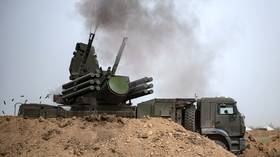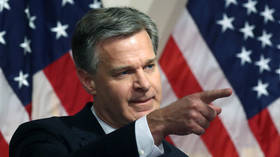De Blasio promises a lavish PARADE for healthcare workers, but history says this could be a bad idea
New York City’s Mayor Bill de Blasio has promised to treat his healthcare workers to a ticker-tape parade once lockdown is lifted. Commenters have blasted the blundering mayor for “basically guaranteeing a second outbreak.”
De Blasio’s response to the coronavirus outbreak in New York has been marred by one blunder after another. In March, he accused President Trump of “playing catch-up” with the virus; yet, two days earlier, he had told New Yorkers to “go about your lives” as normal. That same week he told a radio host that asymptomatic carriers can’t transmit the disease, refused to cancel the city’s St Patrick’s Day parade until convinced to, and personally told a woman returning from Italy not to self-isolate. So exhaustive is the list of his missteps that New York Magazine described the crisis as “the worst stretch of the mayor’s six-year tenure.”
And all of that came before he was spotted at a public gym.
Also on rt.com Rules for thee, not for me! Meet the officials BREAKING their own quarantine guidelinesHowever, De Blasio’s announcement on Tuesday that healthcare workers would be treated to the “greatest ever” ticker-tape parade down the city’s “Canyon of Heroes” – the stretch of Broadway running between Battery and City Hall – was a guaranteed feel-good hit.
“The day is coming where we will overcome this disease,” he said during a conference call with reporters. “When that day comes that we can restart the vibrant, beautiful life of this city, the first thing we will do is have a ticker-tape parade.”
“We will honor those who saved us,” he said, “with a beautiful and joyous day in the city.”
I can’t tell you when we’ll be able to host cultural events and parades again. But I can tell you WHO our first parade will be for:When the time is right, New York City will honor our health care workers and first responders with a ticker tape parade up the Canyon of Heroes.
— Mayor Bill de Blasio (@NYCMayor) April 21, 2020
Such a powerful symbolic gesture would be hard to argue with, de Blasio surely thought. Wrong. Commenters on Twitter slated the mayor for splashing cash on a public spectacle, rather than a raise for health workers and first responders.
Others criticized the idea of cramming millions of people onto the streets in the aftermath of a pandemic, with populist author Ryan Girdusky claiming that doing so would be “basically guaranteeing a second outbreak.”
Highlights from Mayor de Blasio:Early March: go out to restaurants, act like everything is normalEarly April: I didn’t know the disease could be transmitted by asymptotic peopleMid April: we’re gonna have a parade when we reopen... basically guaranteeing a second outbreak https://t.co/zPfH6qUSdY
— Ryan James Girdusky (@RyanGirdusky) April 21, 2020
His claim is not unfounded. As American soldiers fought in the fields of Europe in 1918, the city of Philadelphia organized a massive military parade in late September to bolster public morale and sell war bonds. The Spanish Flu pandemic had died down following its outbreak that March, and people took to the streets in droves to salute their military. Disaster struck. The virus infected thousands of onlookers and the city’s hospitals were overwhelmed within three days. A week later, some 2,600 people in Philadelphia had died from the lethal flu.
And as America celebrated victory in the Great War a month later, further outbreaks sprung up at parades across the country. Philadelphia even organized another parade, which led to the exact same outcome.
"You know what would be perfect right now? A PARADE" - Philadelphia in 1918, Bill de Blasio in 2020
— Mark Gongloff (@markgongloff) April 21, 2020
To be fair, de Blasio did not put a timeline on holding his parade, and will surely only do so once large gatherings are deemed safe again. However, history provides a clear example of what not to do, and the New York mayor may want to put public health ahead of a short-term PR victory.
Think your friends would be interested? Share this story!













